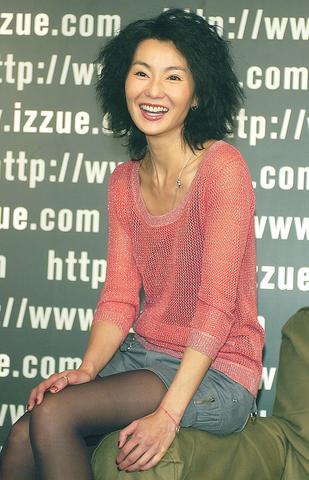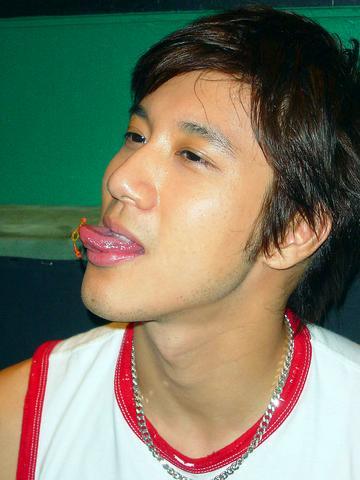Sun Yan-tzu (孫燕姿) Jay Chou (周杰倫) are still the queen and king of Mando-pop after the two became the biggest winners at the fourth Global Chinese Song Award (全球華語榜), which was held last Saturday in Taipei.
Sun from Singapore won "Most Popular Female Singer," "Best Album," "Top 20 Songs of the Year" and "Outstanding Artist in the Singapore Region."

PHOTO: TAIPEI TIMES
Sun has been the winner in the "Most Popular Female Singer" category for three consecutive years, which is quite a contrast to her situation at another Mando-pop award -- the Golden Melody Award (金曲獎). There, she has been nominated for Best Female Artist for three consecutive years, but has always gone home empty-handed.

PHOTO: TAIPEI TIMES
According to Apple Daily (
Jay Chou, who is now called Chou Dong (
Chou held a victory party and celebrated his album Jasmine (
Another Mando-pop star Lee Hom--wang (王力宏) was taking a break last week, sort of. He was caught by Next Magazine (壹周刊) kissing a "mixed-race spice-girl" on a Taipei street. Reportedly, Lee was strolling around Taipei's Zhongxiao East Road district with a young woman called Zoe. The two went into an apartment together and stayed there for two hours. When saying goodbye, Lee was captured kissing the woman's cheek and ears. He later said in a statement that the lady was a good friend from a long time ago and it was simply a courtesy good-bye kiss. But the incident may have ended the long-rumored romance between Lee and pop diva A-mei (張惠妹). Lee wrote a song for A-mei's previous album and now is the producer of her upcoming album. It has been said that the two were found kissing when recording songs in the studio. Wang had also appeared in many of A-mei's concerts as a special guest. A-mei herself declined to comment on Wang's kissing incident. "We have always been friends. He has helped me a lot in music," A-mei was quoted by Apple Daily. Asked how is her love life going, "It could be better," said the singer.
Hong Kong actress Maggie Chueng (
magazine. "There was a period of time I indulged myself in tears and sorrow. But now I'm a different person. I think it was my boyfriend who changed me. I'm really happy being with him," Cheung was quoted as saying. Cheung referred to the time when she went through a divorce with French film director Olivier Assayas. Ironically, in May, Cheung won Best Actress at the Cannes Film Festival for the Assayas-directed film Clean, in which she played a single mom.
After the divorce, a rumor about her being a lesbian was spread in Chinese entertainment circles. "In sex, I am 100 percent heterosexual," Cheung replied. The 40-year-old actress said she has decided not to have a baby. "Not because of divorce, but because after the 9/11 incident, I found the world to be very evil. And I don't want to bring a child to this evil world," Cheung said.
Another woman in love is Hong Kong pop diva Faye Wong (王菲). According to Hong Kong magazine Suddenly At Next (

June 9 to June 15 A photo of two men riding trendy high-wheel Penny-Farthing bicycles past a Qing Dynasty gate aptly captures the essence of Taipei in 1897 — a newly colonized city on the cusp of great change. The Japanese began making significant modifications to the cityscape in 1899, tearing down Qing-era structures, widening boulevards and installing Western-style infrastructure and buildings. The photographer, Minosuke Imamura, only spent a year in Taiwan as a cartographer for the governor-general’s office, but he left behind a treasure trove of 130 images showing life at the onset of Japanese rule, spanning July 1897 to

One of the most important gripes that Taiwanese have about the Democratic Progressive Party (DPP) is that it has failed to deliver concretely on higher wages, housing prices and other bread-and-butter issues. The parallel complaint is that the DPP cares only about glamor issues, such as removing markers of Chinese Nationalist Party (KMT) colonialism by renaming them, or what the KMT codes as “de-Sinification.” Once again, as a critical election looms, the DPP is presenting evidence for that charge. The KMT was quick to jump on the recent proposal of the Ministry of the Interior (MOI) to rename roads that symbolize

On the evening of June 1, Control Yuan Secretary-General Lee Chun-yi (李俊俋) apologized and resigned in disgrace. His crime was instructing his driver to use a Control Yuan vehicle to transport his dog to a pet grooming salon. The Control Yuan is the government branch that investigates, audits and impeaches government officials for, among other things, misuse of government funds, so his misuse of a government vehicle was highly inappropriate. If this story were told to anyone living in the golden era of swaggering gangsters, flashy nouveau riche businessmen, and corrupt “black gold” politics of the 1980s and 1990s, they would have laughed.

In an interview posted online by United Daily News (UDN) on May 26, current Chinese Nationalist Party (KMT) Chairman Eric Chu (朱立倫) was asked about Taichung Mayor Lu Shiow-yen (盧秀燕) replacing him as party chair. Though not yet officially running, by the customs of Taiwan politics, Lu has been signalling she is both running for party chair and to be the party’s 2028 presidential candidate. She told an international media outlet that she was considering a run. She also gave a speech in Keelung on national priorities and foreign affairs. For details, see the May 23 edition of this column,